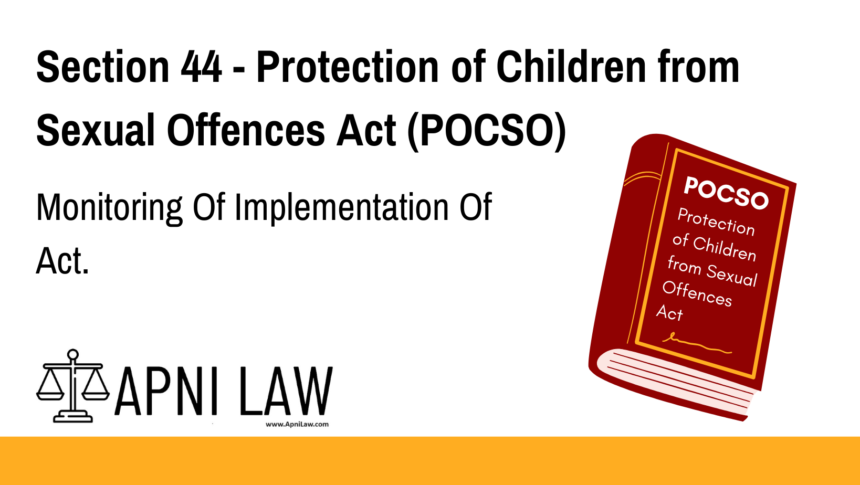Code: Section 44 – Monitoring of Implementation of Act
(1) The National Commission for Protection of Child Rights constituted under section 3, or as the case may be, the State Commission for Protection of Child Rights constituted under section 17, of the Commissions for Protection of Child Rights Act, 2005 (4 of 2006) shall, in addition to the functions assigned to them under that Act, also monitor the implementation of the provisions of this Act in such manner as may be prescribed.
(2) The National Commission or, as the case may be, the State Commission, referred to in sub-section (1), shall, while inquiring into any matter relating to any offence under this Act, have the same powers as are vested in it under the Commissions for Protection of Child Rights Act, 2005 (4 of 2006).
(3) The National Commission or, as the case may be, the State Commission, referred to in sub-section (1), shall, also include, its activities under this section, in the annual report referred to in section 16 of the Commissions for Protection of Child Rights Act, 2005 (4 of 2006).
Explanation of Section 44 POCSO Act
Section 44 of the Protection of Children from Sexual Offences (POCSO) Act places the responsibility of monitoring the Act’s implementation on specific child rights authorities. These authorities are the National Commission for Protection of Child Rights (NCPCR) and the State Commissions for Protection of Child Rights (SCPCR).
Key Responsibilities:
- Monitoring Implementation:
The National and State Commissions must actively monitor the application of the POCSO Act across relevant jurisdictions. They must do this in accordance with prescribed guidelines. - Investigative Powers:
While handling cases under the POCSO Act, these Commissions are allowed to use the same powers they are granted under the Commissions for Protection of Child Rights Act, 2005. This includes summoning witnesses, requesting evidence, and conducting investigations. - Reporting Obligations:
The Commissions must include the details of their monitoring activities in the annual report they submit as per Section 16 of the Commissions for Protection of Child Rights Act, 2005.
Illustration
Example 1: National Commission Reviews a Delayed Case
The National Commission receives a complaint about a delay in investigating a case under the POCSO Act. Using its powers, it summons the concerned officials, reviews the evidence, and provides guidance for faster resolution. These activities are then included in its annual report.
Example 2: State Commission Conducts a Compliance Audit
A State Commission visits schools to check whether child protection protocols are being followed in line with the POCSO Act. After completing the audit, it shares its findings and suggests improvements, which are later recorded in its report for the year.
Common Questions and Answers on Section 44 POCSO Act
1. Who is responsible for monitoring the implementation of the POCSO Act?
The National Commission for Protection of Child Rights and the State Commissions for Protection of Child Rights are tasked with this responsibility.
2. What powers do these Commissions have while monitoring?
They have the same powers granted to them under the Commissions for Protection of Child Rights Act, 2005. These include the authority to investigate, summon individuals, and demand relevant documentation.
3. Are these monitoring activities made public?
Yes. All monitoring activities must be documented and included in the Commission’s annual report. This ensures transparency and accountability.
4. Can individuals submit complaints to these Commissions?
Yes. Anyone can approach the National or State Commission if they believe that provisions of the POCSO Act are not being implemented properly.
Conclusion
Section 44 of the POCSO Act strengthens enforcement by assigning the task of monitoring to national and state-level child rights commissions. It empowers these bodies to act independently and report their findings, ensuring that the protection promised by the Act is not only present in law but is also actively implemented in practice.








